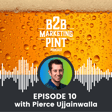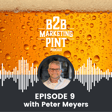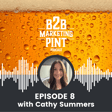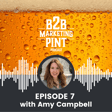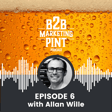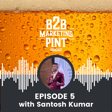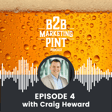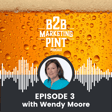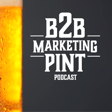Become a Creator today!Start creating today - Share your story with the world!
Start for free
00:00:00
00:00:01

🎙️The 3 Talents Every B2B Marketer Needs
📝In this kickoff episode of "B2B Marketing Pint", Brian and Brendan crack open a zero-proof brew with veteran tech marketer John Blackmore to explore his "three-talent triangle" for modern marketing: the storyteller, the mathematician, and the psychologist.
You’ll hear how great marketers blend narrative, data, and human insight—and why most fall short. From web heatmaps to cognitive dissonance, John unpacks practical examples and valuable 'A Ha' moments. Expect a sharp pour of stories, wit, and ideas for B2B tech pros who want something new for their next meeting—and the market.
Transcript
Introduction: Hosts and Theme
00:00:00
Speaker
Your B2B Marketing Pint is the podcast for B2B technology marketers who want to sharpen their competitive edge. Joined by other marketing veterans, your hosts, Brian O'Grady and Brendan Ziolo, share expertise on what works today and why.
00:00:16
Speaker
Grab
Zero-Alcohol Beverage Choices
00:00:17
Speaker
a cold pint of hot takes on branding, content marketing, demand generation, and more served with a side of sarcasm. All right, Brendan, what's in your glass today?
00:00:30
Speaker
Well, today, ah
Guest Introduction: John Blackmore
00:00:31
Speaker
to support the non-drinkers in our audience, I actually have a Guinness, but it's the non-alcohol version. Very tasty, I might add, and I still am challenged a few people to tell the difference between one with and one without alcohol.
00:00:46
Speaker
ah So if anyone wants to take me up on that offer, I'll meet you at a bar at some date and time. what are you What are you drinking today, Brian? Um, well, i'm I'm not against your option by any stretch of the imagination as an O'Grady. Uh, there'd be a problem. I were against it.
00:01:03
Speaker
Uh, however, today I've got a, an IPA from partake brewery out of Toronto, which is actually by coincidence, also zero alcohol. Uh, that's, that's just because I, uh, may have to give ah blood test tomorrow.
00:01:17
Speaker
You know what I mean? So and that's what I'm into. And so far so good. I'm, I'm enjoying it. I think an IPA is a tough one to replicate, uh, That's zero alcohol, but this one's pretty good. But more importantly than my drink, and we have a special guest joining us today.
00:01:32
Speaker
He's that third fellow on your screen. ah That's Mr. John Blackmore, and we've sent Mr. Blackmore something as
Brian and John's History
00:01:38
Speaker
well. John, what's in your glass? Sure, ah and thank you very much for the gift that you did send and you're kind of shaming me because I do have like full-on alcohol beer here. so But I think that's, I'm trying to be a little bit more of us of a Canadian.
00:01:52
Speaker
So today I've got Dominion City, which is a great Ottawa brewery. And so we got the Maple Leafs there. And also this is their ah beer called Bonspiel. So another great Canadian piece there.
00:02:04
Speaker
in terms of beer based on on curling. And it's a brown lager, and it's a great little beer. Well, now that we've got the most important part of the podcast out of the way, ah what we're drinking today, ah Brian, why don't you introduce John? you ah The two of you go way back, and let's ah let's see yeah learn a bit more about him and understand ah why we invited him on the podcast and what he's going to talk about today.
Essential Marketing Talents
00:02:32
Speaker
I'd love to. and And John, I'll throw you the mic after this to correct the record where I've gone wrong. But um John and I do go back a long time. I think it's fair to say, John, we're we're longtime ah colleagues, friends. In fact, you were my boss on multiple occasions.
00:02:48
Speaker
on different digital marketing teams in places large and small, places like IBM, some listeners may have heard of, ah other places like GFI software and more recently, field effect software.
00:03:01
Speaker
And I know through personal experience that John brings a wealth of B2B tech experience to this podcast and the table in general. And more interestingly, i think, John, you bring a a philosophical bent to marketing that's definitely helped me over the years. And I think it'll help others as well who listen today.
00:03:20
Speaker
And it helps by allowing all of us to better conceptualize the role of a modern marketer. um Outside of that, don't want to steal the thunder of the conversation, so I'll say outside of working in tech and marketing, John is a son of Newfoundland, and John is also accomplished creative writer.
00:03:40
Speaker
There's a chance I have a book of John's poetry around here somewhere. Very good. Yeah, hopefully you do. it if not, we can definitely, there's a number of those in a but in a box somewhere that I can send to
John's Approach to Marketing Strategies
00:03:54
Speaker
So that'd be great. Yeah, no, that's right. Brian and I've worked, my gosh, it's well over two decades, which is scary. um Cognos, I guess, was our first experience together, which was a great ah great run we had there, discovering the wild, wild west days of when paid search began. I see you're Google partners in back there back in the day when AdWords was just beginning.
00:04:18
Speaker
um So yeah, we've had lots of ah wild and woolly experiences both here in Canada and lots over in China and Japan and some other farther afield. So yeah, it's great to be here and great to talk about it.
00:04:33
Speaker
I think, you know, when you mentioned philosophy. um I think, you know, working with you, Brian, and then the collection of ah band of merry people that we had both at Cognos and IBM, really smart people.
00:04:47
Speaker
And you could pretty much any moment pitch a weird idea and somebody would take it and start running with it and adding to it. And I'd say that's probably where part of this you know philosophy idea and inability just to really talk about strange concepts when it comes to marketing or business really arose.
00:05:04
Speaker
We had a lot of intelligent people around us. And we had a lot of people who are always interested in asking, you know, strange questions and and the why. So, yeah, it was we had we've had a fun ride so far.
00:05:17
Speaker
so I'm, yeah, I'm very intrigued as I don't often hear the word philosophy, John, applied to applied to marketing as ah as a general rule. And I'm sure there's a whole lot for us to discuss here.
00:05:31
Speaker
ah But why don't you take us through what you see as those three essential talents ah for a marketer? And I know you've written an article about this as well. So obviously, we'll post that in the show notes so people can read that as well. But kind of walk us through the idea as a starting point here so the audience knows where you're coming from.
00:05:51
Speaker
Sure. No, thanks, Brendan. um So the idea is that, you know, Brian and, you know, Brendan, we'veve we've been in marketing for a number of decades and we've worked with a lot of really amazing marketers.
00:06:02
Speaker
And so when I just took a step back and started to think about what we, what I've done, what you know, you've done, what we've done together and some of these other people, I kind of see if you can imagine your head like a triangle.
00:06:14
Speaker
I can do a triangle well here. At each of the apex of
Experiences Across Company Sizes
00:06:18
Speaker
the angles of the triangle, there's sort of like three talents. And the interesting thing that, you know, when I think about it and the people that we've had the opportunity to work with, ah it's challenging for anybody to have all three talents, but we all know people who've had at least one or, you know, in better way, two of those talents.
00:06:37
Speaker
So if you think of those three angles, one of them, I would say, is the talent of being a storyteller. The other one is to be a mathematician. And the third is to be a psychologist.
00:06:49
Speaker
So I find that expertise, talents, and thinking in each of those sort of zones are critical pieces to making a successful marketer and successful marketing activities.
00:07:05
Speaker
Yeah, that makes sense to me. um And based on my experience, you know, people have a very different um levels on each of those three, three skill sets. Some people are very, very strong on one. Others are are more balanced.
00:07:19
Speaker
But it's pretty rare, I think, to have to have all three. um So here's a question based on that. then For someone who's strong in one area, let's say you're strong in the storytelling. and I like to think I'm strong in the storytelling one.
00:07:33
Speaker
how could How could you start developing an area, the other two, for example, are where you're weaker? Sure, that's a great question. i mean I mean, I think one of the first things is, and i when I'm thinking about this particular approach, ah just being aware that there are different talents, because often we get blinded by what we do well and we think that's the way the universe operates.
00:07:54
Speaker
So probably like you, I might have considered myself more of a storyteller, um but I was lucky as well, and especially if you think of our climate when we were at Cognos, it was really at the beginning days of us doing a lot better um measurements.
00:08:09
Speaker
We had a lot better marketing metrics really just kind of coming on stream. And I think also, if you think about it, our experience has been very strongly in the digital marketing space, which you know back in the day was kind of a new thing. Obviously, it's not very new anymore, but it was it was a new new discipline.
00:08:27
Speaker
And it was usually assigned to the the miscreants and the misfits in the organization because the real marquee people did the events. And then there's the rest of us mopping up this web thing because it's just an annoyance.
00:08:38
Speaker
Now, the wonderful thing about the web is it's completely measurable. Everything you're doing leaves some kind of trail, some kind of trace. And we are starting off with that and we we're getting all of these numbers.
00:08:50
Speaker
So back to your question, what happened, I think for us, we might have both been storytellers, but then we were face to face with all of these measurements. And then what you do is essentially you can use the measurements to test your ability of what is your story working well or not.
00:09:06
Speaker
um And to take a step back, like so storytelling sounds like, you know, it's it it's like somebody spinning a yarn, but which can be, you know, it can be like creating these amazing commercials or things.
00:09:18
Speaker
But if you really think about it at its heart, storytelling comes down to in a lot of ways like word choice. And if I think of one of our experiences together, Brian, if I think of word choice and the sort of this combination of using math, and then really with the math, the storytelling, getting at the headspace or the psychology of of a colleague or of ah of a customer.
00:09:40
Speaker
So I remember one of our first experiments that we did or one of our first Eureka moments, we had a website, Cognos website. We like to talk about ourselves like everybody else does on the web, talk about our latest press release or latest announcement or or what have you.
00:09:54
Speaker
But we started to discover because we bought this tool that alloweds to allowed us to see where do people click. And funnily enough, the one word reporting, which used to be down in the bottom of the website below the fold is down in that sort of Weasley area where you put all your SEO terms.
00:10:11
Speaker
It was like number two or three of all of the clicks happening on the website. And I thought that was like weird because, you know, we had all this stuff up above that we were trying to shout at people.
00:10:22
Speaker
we're That's the story we were telling, but all the people were down kind of clicking on the reporting. So then we sort of moved it up and then, well,
Marketing Strategies: Small vs Large Companies
00:10:30
Speaker
moved it around on the page. People kept finding it. People kept clicking on it until eventually we said, hey, what if we make it like a big ass button right on the page reporting?
00:10:41
Speaker
And bingo, everybody started clicking on it. And I'd say in a way, I don't think I articulated this sort of philosophy of psychologist, mathematician, and storyteller back in that day.
00:10:52
Speaker
But I'd say that's probably like the genesis of where this idea comes from. Because we were telling a story using a word that really connected with what the person wanted. So we're trying to get into the headspace of our visitor. Mm-hmm.
00:11:05
Speaker
And again, that's another thing we used to do in web. They're visitors. They're not traffic. They're visitors. They're people coming into my house, coming into my digital home, and they're looking for reporting. And we saw that through the the metrics, through the math.
00:11:18
Speaker
And I'd say that's probably like a really good example of how you use you know storytelling, math, and psychology all sort of working together to provide those better experiences for your customers.
00:11:31
Speaker
Yeah. So I think, John, the storytelling and math side, you know, that makes sense and and was definitely not what jumped out at me. It was that psychology part.
00:11:42
Speaker
When I read the article first time, I'm like, okay, that's interesting. Like the first two were pretty clear what you mean. And you've touched a bit on that in your example and stuff like that. And I think you've got some other examples in the article as well, if I recall. But You know, if I think of the marketers I know, there's definitely some that are, you know, in the data, love the analysis. There's some that are great at storytelling.
00:12:03
Speaker
I'm going to guess that most like most would struggle more with the psychology part. Maybe that's not your experience, but it's definitely mine. Could you kind of let us know how you think someone can build that skill set, maybe tap into that? Yeah.
00:12:18
Speaker
part of the triangle and um really improve their overall overall approach. Whether they're a storyteller or math by trade, I'm just thinking psychology is the one that most probably need to explore more.
Emotional Depth in B2B Marketing
00:12:32
Speaker
Yeah, no, I would agree with you. I mean, I've always considered that definitely my weakest element of the three, not that the other two are spectacular, but definitely psych. And it was really brought home to me like my youngest daughter studying psychology. She did ah a bachelor's degree, a master's degree, and now she'll be doing a PhD in psychology.
00:12:53
Speaker
And she illuminates so much about psychology for me that I had you know no idea. I'd never studied it really. and i think it's probably one of the most important things for not just marketers, but almost anybody on the planet to get a sense of the the guidebook of how our minds are operating.
00:13:11
Speaker
um you know A couple of things that I think were my inroads into it, um we used to have a conversation when we're doing, you know for example, designing web pages, the idea of cognitive dissonance. um flip back i remember this I had this conversation with my daughter once. i was driving her back to Queen's University from Ottawa.
00:13:29
Speaker
and I asked her, know what would be like a Nobel Prize in psychology? Because I'd studied other sciences, the hard sciences when I was in university, and there's there's Nobel prizes for that.
00:13:41
Speaker
There isn't one for psychology. So I was kind of throwing it out to her almost in a way like like, what would she say? And you know she rattled off all of these different topics that could have been or should have been really Nobel prizes.
00:13:53
Speaker
And one of them that she did mention was cognitive dissonance. So back to that, you know, one of the things that we often do as marketers or you've probably all experienced, marketers get into marketing speak or people who maybe are not marketers, they start to try to write like a marketer where, you know, we're the world leading blank or we're optimizing high efficiency networks 24 seven, you know, just kind of just blah stuff.
00:14:16
Speaker
And all of those terms that are not really, you know, I can't really back them up easily, those introduce cognitive dissonance in any of the the readers because they're forced to take a step back and say, well, you know, really? Or says who?
00:14:31
Speaker
Can I trust this? And so that's just an example of us, you know, kind of Accessing some of these ideas about psychology as we're marketers is making sure that we're you know not committing any sort of like psychological ah flaws or psychological errors.
00:14:48
Speaker
But I think you know a lot of it comes back to, again, really trying to understand and think like your customers. And you know there's two real ah you know textbooks that I've sort of picked up on since you know discussing this through with my daughter.
00:15:05
Speaker
ah There's a really great book, Thinking Fast and Slow by Daniel Kahneman. And there's another one that I picked up just recently, kind of goes another step further. It's a little bit deeper and a bit denser, but it's I think it's called the enigma of reason.
00:15:20
Speaker
And basically what they both come back to is as humans, we're extremely irrational. We think we're rational and we think we use reason, but we don't.
00:15:31
Speaker
So that almost just that sort of like very basic insight um along with a couple of other psychological insights can arm a marketer to be a far stronger marketer by just giving you sort of like the, you know, the fundamentals or foundations of some approach to good psychology.
00:15:50
Speaker
That's a cool example. And you've triggered and an anecdote ah for me that I'm sure will be corrected in the comments later if I get my psychology wrong. ah But your your point about how we make decisions, what I heard years ago, and I've tried to keep with me since, how we make decisions as a creature is first we make a choice. And and they can see this apparently by seeing the parts of our brain light up in order.
00:16:10
Speaker
First we make a choice, and then the rationalization center in our brain lights up to justify that choice. Yeah. Apparently what differentiates some great leaders from average people is after they've done that, they send it back in to be reprocessed as a choice again.
00:16:26
Speaker
And apparently that's what one of the differentiators is among good decisions and otherwise just ah emotional, irrational insanity. um I do have another question for you though, and I think you touched on it because you you've mentioned ah the storytelling and you've mentioned the math and that potentially the the gap you want filled for you is is psychology.
00:16:45
Speaker
But I'm going out you a little bit for our audience. If I remember correctly, you've got a background, an unusual background, which I think makes you kind of ah a bilingual marketer. If I remember correctly, you've got a background in both journalism and physics from an education perspective.
00:16:59
Speaker
is Are they the two disciplines that brought you to this this idea or do they they influence how you operate as a marketer? Yeah, no, absolutely. um it's It's funny. so the You're correct. i did I did complete a physics degree first when was in university.
00:17:16
Speaker
And full disclosure, i'd be probably the world's worst physicist. So I don't think CERN or NASA will be picking up my chit anytime soon. But yeah, massive impact on the way I think and the way I approach, which is really all university is, right? It's just a a mode of thinking.
00:17:34
Speaker
And I'd say what I pulled from that is I incessantly build models. So, you know, classic, you know, marketer thing is funnels, right? So I absolutely love the funnel and I,
00:17:46
Speaker
you know diagram out a lot of the pieces of the funnel. The other thing though with physics, physics operates in a very idealized world. So im I'm not going to you know nth degree everything. We will sort of round it and just come up with a ah model of basically how things are operating.
00:18:03
Speaker
And then that's your hypothesis. And then you watch what people do.
Empathy in Marketing Strategies
00:18:08
Speaker
And so that's probably where you kind of then start to infer the the psychology of it. But um yeah, i'm ah i'm I'm a big believer in taking that approach, which then just gives you sort of like that that very basic math.
00:18:23
Speaker
um Like actually, I was just chatting through with my yeah CMO just the other day, we're sort of going back and forth on our model. i I built a model based on target, she based a model on budget, and we met in the middle and they actually both aligned, which was like a wonderful thing.
00:18:39
Speaker
So, yeah, it's it's it's a critical piece of it. um You know, I think that um that concept, though, of like measurement and experimentation, if I can just riff on that for a moment.
00:18:52
Speaker
um You know, one of the things that, again, we did together, Brian, as digital marketers, um you know, we we stopped and we actually conducted, you know, surveys where we asked the people who are coming to our website, what are you trying to do here?
00:19:07
Speaker
you know and i And I think, if if anything, you know there's a lot we can get onto about the philosophy of the triangle and the storyteller, psychologist, and mathematician. I think the really important thing is just taking that step back and thinking about it in that way.
00:19:20
Speaker
So you're trying to think about what am I trying to do? And then that forces you or hopefully drives you, I guess, into some actions. So for us, it was trying to get into the headspace of,
00:19:30
Speaker
What are these people doing when they come to our website? And you know some of those things, back to like some very basic psychological concepts, you know there's ah the great line by, I think it's Jakob Nielsen, where the web visitor is lazy, selfish, and ruthless.
00:19:47
Speaker
And, you know, I think that expresses, as you talked about, the, you know, we're not really rational creatures, we're quite irrational. So we're driven by what we're driven by. And that's really all we can see. So the more that we as marketers are aware of that, not to pander to the crowd, but to be aware So people aren't you know waking up every morning looking for our message or looking for what our feature functionality is that we might try to tell them on the website.
00:20:14
Speaker
We have to get in and think about what their needs are what are their drives, what are their ambitions. And the more that we can link up with what we're offering with that need, you know the better success our stories will have.
00:20:28
Speaker
And then we'll see that in terms like the models, in terms of the the metrics that come out the other end.
Conclusion and Invitation to Subscribe
00:20:34
Speaker
um If I remember correctly, when when Brian walked through some of your bio at the start, there was a mix of smaller and larger companies that you've worked with. So I was just curious if you saw these three skill sets being different or different emphasis or different mix, kind of, you know, the startup versus the more established ah enterprise versus maybe, you know, the global behemoth, if any of those fit. I guess you worked at IBM, so it does fit.
00:21:03
Speaker
um But yeah, is there any difference there or do you not think the company, the size, the industry or anything like that really matters here? Yeah, I was thinking about that. um i would say that, ah again, the the big value is the, you know, well, one, it's it's just thinking, right?
00:21:24
Speaker
um You know, my my poor kids, we used to, early on when we were driving the car, I used to you know, we'd have conversations. One of the things I used to say was that it's the Socratic concept of, you know, the unobserved life is not worth leading.
00:21:39
Speaker
and they were seven at the time, and I think think they appreciate that whole story. But they come back and told me that, you know, okay, we I remember that, Dad. um So, you know, the the whole thing with the triangle is it does, ah it again, it's just, it makes you question what you're doing and why are you doing it and what results do you think and what's really happening here?
00:21:59
Speaker
Because a lot of times, if you think about it in both small and big, like small companies especially, we end up juggling a lot of different plates and we were often just like hellbent for leather doing stuff. um But sometimes you do need to take that step back.
00:22:13
Speaker
um Like it's not quite related to the triangle, but it's a little bit more like that idea of of stepping back. One of the things that I've tried to do as I've worked at different size companies is, um you know what is my overall, my my Uber marketing strategy or ah So for example, you know we' were at a Brian and I both worked at a company had mentioned that was a smaller company and it was a little bit of a hardscrabble little company.
00:22:43
Speaker
And we were I would say that our attitude was that we were marketers like we were pirates. So we were going to go off and we would have the eye patches and we're just going to do whatever needed to get done.
00:22:55
Speaker
And we're a little bit more ah guerrilla warfare like that. At IBM, the concept was I'm a colossus and I can crush anything that I want to.
00:23:05
Speaker
if i can just If I focus on it, we can crush it. I mean, we had our own you know yeah URL string, like you got your own IP yeah address as IBM. So for example, we went out and we decided SEO-wise, whatever we wanted to win, we would go out and win. And lo and behold, we did. We could create pages based on a term and just crush it because nobody could stop me.
00:23:26
Speaker
Similarly with paid search at IBM, like if I want to spend the money on it, you can't stop me. um So the the company I'm at today, you know, we're getting back into the the smaller world.
00:23:37
Speaker
So the basic philosophy there is um I lose every game I don't get invited to. So my marketing strategy is very much about ah finding the signals of intent and then inserting myself into conversations.
00:23:53
Speaker
So it's a little bit like i'm an interrupter. It's like, oh, you haven't heard of me, but, you know, so that, so I think again, It's like there's like an uber philosophy of the approach. And then you go back to looking at, ah you know your measurement and your storytelling, how that ah reflects and supports that particular approach to your overall marketing strategy.
00:24:15
Speaker
Cool insight. um I think you may have just alluded to her or referenced a rather famous Gretzky quote, which is often misattributed to the great one himself, to Wayne Gretzky. I think it's actually from his father, Walter.
00:24:28
Speaker
And if I remember it correctly, it's you you miss 100% of the shots you do not take. and And by coincidence, if people couldn't tell this was a Canadian-based podcast, they do now because we're talking about hockey.
00:24:40
Speaker
know you strong opinions on that as well, John, but we'll save that for another episode. I've used that one, actually, that quote when we were talking about back... So I've been here now for two years. So back in the early parts of 2023, that was the the concept, right? Like, again, we lose every game, we miss every shot.
00:24:57
Speaker
And small companies especially, right? We don't get invited to the games. So we've got to find a way to... you know, ah get into those conversations. and that's part of our, you know, use the psych, use this use the math, use the storytelling to get yourself into those conversations.
00:25:15
Speaker
Cool. I'm going to dive in with one more, Brendan, because I can tell you're on the edge of your seat more, but to get to make this more applicable or to take it out of theory land and to make it a bit more applied for for folks who are saying, hey, sounds great.
00:25:27
Speaker
Now, how do I do it? Or how how would I do it? How would I put this to work? in your article on the on the three talents of a marketer, you give a couple of examples of brands everybody knows and some I like, Apple and Dyson in particular.
00:25:43
Speaker
um And they might be pretty good examples of brands that are playing with psychology at ah at a high level. So my question for you based on that in the article is if you're a B2B marketer and this is this is the B2B marketing pint, we're all B2B marketing folks here and I imagine most of the audience is too, or somebody who's straight in looking for beer information.
00:26:03
Speaker
ah But anyway, if you're a B2B marketer, ah using using Apple and Dyson as examples, how can they tap in to sort of an emotional depth for what they're marketing without, you know, considering these are big businesses, these are well conceivably boring brands as well. So when you're trying and apply emotional depth to something that's big business, you could fall astray, you could go astray.
00:26:27
Speaker
How do you do that as a B2B marketer? without just falling into into cliches or or using them overused catchphrases in an attempt to connect with your audience? How do you get a depth of psychology happening in a situation like that?
00:26:41
Speaker
Yeah, it's it's a good question. um And if you think about it, I often think about like, well, marketing is, there's like two big sides of it. There's like brand marketing and DG marketing.
00:26:55
Speaker
um and B2B, in my world of B2B, I've been far more on the DG side of it. um I would say that, you know,
00:27:06
Speaker
With the consumer, um like the consumer, the brand and the the psychology and the emotional piece of it is far more important because one of the things that we deal with often in B2B, it's usually not a single decision maker, right? There's like a buying committee.
00:27:21
Speaker
So you've already got multiple candidates who you're going to have to try to understand the psychology. So really, it's you're in a way, you're almost like so trying to psychoanalyze a business or a company, right?
00:27:34
Speaker
So I think one of the things is understanding, um you know, the emotional benefits that your product can bring beyond just solving particular business pains, right?
00:27:46
Speaker
So just as an example, you know, you know, for our company today. So field effect where I work. So we're a cybersecurity vendor. So what are we selling? So I mean, some of some of my competitors are selling ah absence of fear.
00:28:02
Speaker
So they really trade on, you know, scariness. If you think of a lot of brands in cybersecurity, there's, you know, the faceless hoodie, there's there's often like mythological beasts, there's, there's grand, you know, creatures that are coming to get there, all of the viruses, etc.
00:28:18
Speaker
Everything about it is a threat. It's a very scary world. um The one thing that we looked at you know in ah sort of an emotional or psychological side of things um is what we want to sell you is actually peace of mind.
00:28:33
Speaker
um And because like in some ways, i mean, cybersecurity is, you know, it's a bit of a pain to have to spend money on it because it's not core to my business. I just want to operate, you know, Bob's bagels, make nice sandwiches for people.
00:28:46
Speaker
But because I'm taking in, you know, maybe you're I've got like a membership thingy. So if you get five bagels, you get a six one free. So I got your customer data. If I lose that customer data or it gets hacked, my business is defunct. and I could go out of business tomorrow because of cybersecurity, not because I did bad bagels.
00:29:02
Speaker
So what we want to be able to offer to you, again, is that peace of mind so that you can just go do your job. You do your job. We'll do our job. Let's not focus on all the scariness.
00:29:14
Speaker
Let's just focus on, I want to let you sleep at night. So then what you have to try to decide is, you know, how do I imbue that kind of story into, you know, the the messaging?
00:29:26
Speaker
But at the same time, you know, you have to be able to give what people are looking for. Like, ah again, if I think on the DG side or, you know, I referenced, we used to ask, we looked at what people wanted from our website or our web traffic.
00:29:39
Speaker
And we found out, you know, those lazy, selfish, ruthless visitors, they want to know what does the product do? what are its yeah What does the product do? Its features and benefits.
00:29:50
Speaker
Show me how it works. Tell me how much it costs. So those are the three things. So balancing maybe your overall emotional appeal that you might want to have. At the same time, if I can give you exactly what you're looking for when you come visit me, you may not realize it, but you're having a strong brand experience because you come to me, you interact with me, and you don't leave with your head scratched. like You're just like, okay, I get what this thing is now.
00:30:16
Speaker
So I think in the B2B side, if we're thinking a little bit on what is the emotional value of your product to a company and try to think about that company as like ah as an entity, as a as a person.
00:30:30
Speaker
And then at the same time, also imagine what it is the individuals of that company when they come and start interacting with you and serving those things up. Yeah. I've always said, you know, a good web experience is a strong brand experience.
00:30:45
Speaker
And sometimes we do such wacky things on a website that to, you know, disincent people from actually interacting with us because we're not really seeing them as real people who are coming through.
00:30:57
Speaker
So I guess that'd be my sort of like two, uh, takes on that when it comes to B2B and using the triangle idea. So, uh, Before we wrap up, John, maybe one final question, just to kind of put a bow on it or a shamrock on top of my Guinness, depending on the analogy here.
00:31:16
Speaker
If you had to just pick one of these talents, which would it be and why? Yeah. Oh, I was afraid you're going to ask that. That's why we left it till the end. Yeah.
00:31:29
Speaker
um Okay, I'll go with like my first thought on it is probably going, i don't know. Okay, I was going to say math.
00:31:41
Speaker
And you know that probably reflects where I come from. But I think that that idea of um measuring and experimenting, just that headspace is going to serve you well because you're never really satisfied. Like, you know, um you asked about, you know, the difference working for small companies and big companies.
00:32:04
Speaker
Sometimes you'll find in big companies, there'll be a hubris where people don't ever really look at the numbers. It's just like, it's in a funny way, they go on gut more than a small company. Because in a small company, I mean, the numbers always right in front of you because you're always like, it's a razor's edge, thin, a razor thin edge between we're working it out or holy crap, we're we're going to bankrupt.
00:32:24
Speaker
um So I think just having that headspace of or that attitude of we never really know and we can always know more ah is probably a really good one.
00:32:37
Speaker
And then my my second one is is likely psychology because it's a it's it's if you think of it even just from ah like an empathy side of things, if you're trying to imagine what is it that you know my visitor is going through, like, like you know,
00:32:56
Speaker
Brian and I have had like lots of experience in in web you know development. And you know the amount of tone deaf web pages that are out there is is staggering. And if anybody just took us moment to say, even if they looked at their logs, what do people click on?
00:33:10
Speaker
They get a sense of what do people want? And you know again, it's not pandering. It's just giving people what they want helps you there's like a venn diagram overlap of here's what i would like you to see and here's what you're wanting to see the more that i can match in that space that's going to be a great experience for you and a great experience for me which again it could come back to you could mathematically model that and see it so i will pick two out of the three i
00:33:43
Speaker
good good examples and uh I've got so many more questions, but we have to wrap up this episode. We might have to have you. We can do part two, you know. We'd have to do a part two. um one One thing you made me think of there is you referenced you know checking in with what people want and figuring that out and giving it to them.
00:34:00
Speaker
Seems basic, seems simple. And I think most marketers, most B2B marketers will cite examples like, you know, there was somebody at Google back in the day whose job it was just to keep that homepage blank and just the one thing is give people what they want. And then the next person will say, yeah, and Amazon became Amazon because they eliminated friction from every step of their journey. They gave people what they want.
00:34:20
Speaker
And we will all nod and then we'll go into a boardroom together and design something completely different that doesn't do any of those things. So that's unusual. And we'll have to explore that part of marketing psychology in our next episode.
00:34:31
Speaker
But I want to share two quick anecdotes to wrap up that you've reminded me of in our time together. One of them is you referenced early on that you you perceive, especially if you appreciate psychology and humans, you perceive people who come to your website as visitors, not traffic. And I can remember when you crystallized that for the team at Cognos, you said, and I can't remember what the number was, but I'll say 3,500.
00:34:54
Speaker
If you had 3,500 people a day walking into your lobby, looking around, trying to talk to you, Would you get coffee? Would you get some donuts?
00:35:05
Speaker
Would you arrange to greet them? and And I could see everybody in the room's eyes light up. I thought, oh yeah, maybe we're thinking about this website thing the wrong way. It's not just us pounding our chests, talking about how great we are. We actually have to receive visitors and and treat them like visitors. i mean, Walmart figured it out. They've got greeters at the front door.
00:35:22
Speaker
That was one anecdote that you reminded me of. And the second one was ah you referenced one of my favorite types of web technology, which is a ah heat map. and the first time We got our our hands on one of those at Cognos. I remember we had the whole team organized for the heat map to go in and deal with a very contentious, very expert, but very contentious subject matter expert after we'd written these beautiful and designed these beautiful web pages.
00:35:45
Speaker
And we knew the contentious web ah contentious product expert was going to cut them to ribbons in the review because that's what he tended to do. And so we came ready for war and we sat around the boardroom table. We marshaled all of our arguments and we brought in the contentious subject matter expert and we turned on the heat map, which most people hadn't seen at that stage. And we told him what it was and it showed where people were clicking.
00:36:06
Speaker
And then he said, oh, I see what you're talking about. Yeah, go ahead and do exactly what you want to do. And it was the most anticlimactic meeting we'd ever had. We all looked each we couldn't get out of the room fast enough because of the scope of the win by using the data to so to support that. So you reminded me of both those anecdotes today. So we've we've had some good times together.
00:36:25
Speaker
I really appreciate you sharing these concepts and and this article with us. I encourage everybody to have a look at it. any Any final thoughts before we wrap this up? No, I mean, this has been fun. um And I think you what you remind me is, I mean, I'll go back to the you know the lesson to my poor kids when they're seven in the car.
00:36:44
Speaker
It's the unobserved life. Like you really have to take a step back often and ask yourself, like, what am I doing here? Why am I doing it? And lot of really you know great marketing comes out of that.
00:36:57
Speaker
We do get stuck in ruts and we do get stuck against deadlines where we just go off and do things. But when you really stop and really try to think through what what am I about, like the one that you referenced, I think out of that we had we came up with the concept right of I am the ombudsperson for the web visitor.
00:37:16
Speaker
So I have, I need, and there's couple of things with that. Like I need to represent their needs, but I also need to represent their value back to the organization. Like that to your point, cause you know, we were in the early days of web marketing and they, we used to say like web visitors were hippies and Birkenstocks. Like people didn't really have any respect for them. Real people came to my event in in Vegas, but it's like, no, no, no, no no They're real humans.
00:37:41
Speaker
And um that was our job was to make sure that they had a voice at the corporate table. and their value was respected that they could bring to us. All right. Well, John, thank you very much for your time. It was great to meet you. I still can't believe we're in the same city, same, same, same, same everything and we've never met, but I'm glad, I'm glad this was, ah this came together and we got to meet and to our, our listeners welcome to B2B Marketing Pint as this is our first episode.
00:38:12
Speaker
We hope you enjoyed it. ah Remember to like, share and do all those fun stuff with it. Don't forget to subscribe. And we look forward to our our next guest and more episodes like this in the future.
00:38:25
Speaker
So thanks, John. And we'll see you next time. Thank you. Cheers. Hey folks, if you liked that episode, you won't believe the next one. So don't forget to subscribe on your favorite platform and you won't miss out.
00:38:37
Speaker
Or you've got an idea we haven't thought of yet, hit us up in the comments. We'll cover that too.
